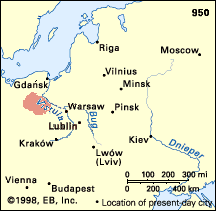|



|
Sad but true: the contemporary poetry of Poland
cannot be understood in full without a glimpse of that country's history. During the last
thousand years, Poland went through all shapes, positions, and sizes, from a
middle-sized newcomer to Christian Europe's family of nations, through its
16th-century
empire, the country's disappearance from maps in the 19th century, and its rebirth as an
independent nation in the 20th. See how it dances all over the map of that part of the world?
This could not, and did not, remain without a
tremendous impact on the culture of the country. The medieval beginnings of the state
branded its literature and arts with the indelible mark of Western
Christianity,
adopted in 966. The Polish Golden Age of the 15th and the 16th centuries was
reflected in its enjoyment of the Renaissance, shared with most of Western Europe. Its
Baroque bred the unique and self-assured multicultural phenomenon of Sarmatism as well as
the emergence of one of Europe's first republics, the Rzeczpospolita.. This
premature experiment in democracy led to the country's disappearance from the map of
Europe under the blows of its greedy (and absolutist) neighbors. The trauma, coinciding
with the Romantic revolution in world culture, resulted in the peculiar variety of Polish
Romanticism, which seems to weigh on the country's literature until today.
This literature received an additional traumatizing yet stimulating jolt in the
twentieth century, when Poland's regained independence, a result of a simultaneous defeat,
in World War I, of the three partitioning powers, survived only two decades before two of
the century's totalitarianisms, the Nazi and the Soviet, once again partitioned the
country in the Second World War. The tragic experiences of the occupation, the resistance
and the Holocaust contributed to a further development of a unique literary idiom.
When, in 1945, the Western world celebrated the end of the war, the war itself or its
almost as destructive aftermath did not end for the nations of Central and Eastern Europe,
which found themselves on the wrong side of the Iron Curtain. Once again, in the absence of
political means of expressing discontent, literature received this additional burden in an
endless battle of collaboration, compromise and conflict with the regime's preventive censorship. This
required the use of a whole paradigm of symbol and allusion which became the watermark of
much of Polish poetry of the fifty years of Communist rule. Together with other aspects of
a veritable alternative society, of resistance, it worked towards the dismantling of the
Soviet empire, which began in Poland in the eighties.
Liberated literature throughout the former Soviet-dominated bloc now faced the
challenge of extending its scope from its almost traditional role -- in Poland -- of
promoting the idea of national identity, of its empowerment, towards new themes and
subjects of a suddenly opened and globalized world culture.
|
 |
![]()